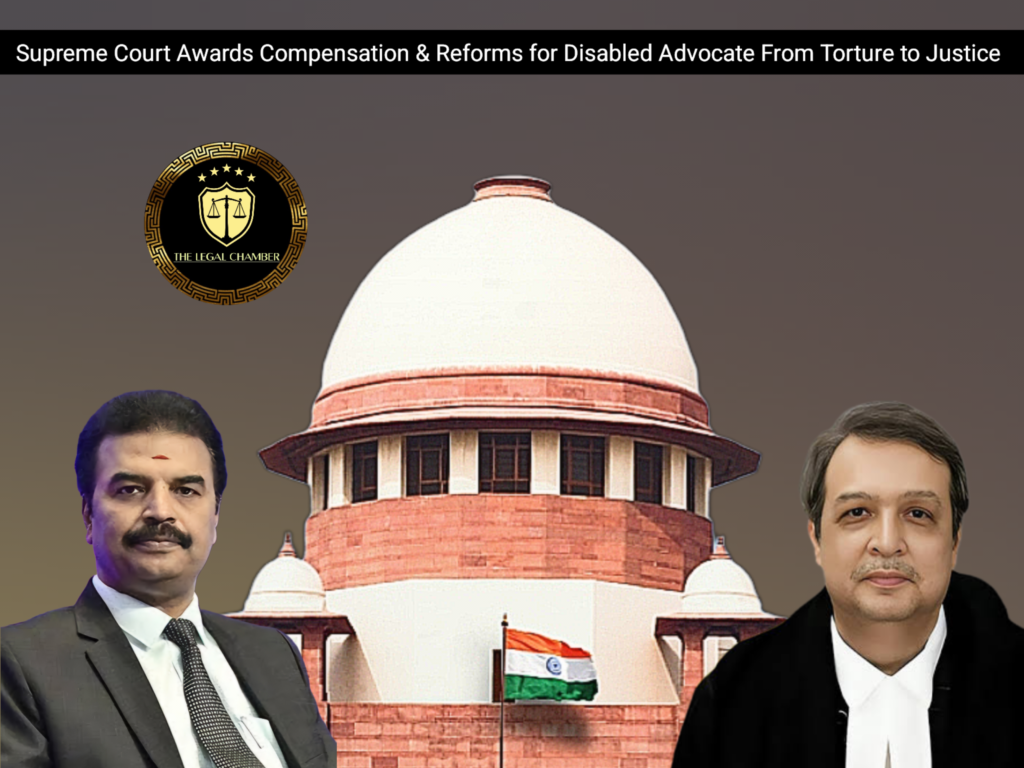
The Supreme Court upheld the rights of prisoners with disabilities under the Rights of Persons with Disabilities Act, 2016 (RPwD Act) and Article 21 of the Constitution. It mandated accessible prison infrastructure, reasonable accommodations, and healthcare for disabled inmates, while emphasizing state accountability under UNCRPD obligations. The Court also reinforced compensation for rights violations and directed systemic reforms, including training for prison staff and periodic audits to ensure compliance with disability-inclusive standards.
Facts Of The Case:
Procedural History:
The case originated with the arrest and incarceration of L. Muruganantham in February 2020 following a disputed FIR. After his release, he filed a complaint before the Tamil Nadu State Human Rights Commission (SHRC), which in August 2021 awarded him Rs. 1 lakh compensation and recommended disciplinary action against the arresting police officer. Dissatisfied, Muruganantham approached the Madras High Court through Writ Petition No. 22431 of 2021, which in November 2022 enhanced the compensation to Rs. 5 lakhs but dismissed allegations against prison authorities. The High Court also directed sensitization programs for police and prison staff under the Rights of Persons with Disabilities Act, 2016. Aggrieved by the partial relief, Muruganantham appealed to the Supreme Court via Special Leave Petition (Civil) No. 1785 of 2023, which was converted into Civil Appeal No. 9487 of 2025. In its July 2025 judgment, the Supreme Court upheld the compensation but expanded the scope by issuing binding directives for prison reforms, accessibility audits, and disability-sensitive protocols, reinforcing constitutional and statutory safeguards for disabled prisoners. The case thus progressed through quasi-judicial, High Court, and Supreme Court stages, culminating in a landmark ruling on prisoners’ rights.
READ ALSO :Parallel Proceedings Lead to Heavy Costs: Supreme Court Slams Appellant for Hiding Facts, Upholds Environmental Compliance
Court Observation:
The Supreme Court made several critical observations in its judgment. It strongly condemned the inhumane treatment of disabled prisoners, noting that the appellant’s fundamental rights under Articles 14 and 21 were violated due to the lack of reasonable accommodations in prison. The Court emphasized that incarceration does not extinguish human dignity, and authorities must ensure accessible infrastructure, medical care, and disability-sensitive protocols under the Rights of Persons with Disabilities Act, 2016 (RPwD Act).The bench highlighted systemic failures, including the absence of protein-rich diets, physiotherapy, psychotherapy, and accessible toilets for disabled inmates, which worsened the appellant’s health. It noted that prison manuals remain outdated and fail to address modern disability rights standards. The Court also pointed out the state’s constitutional obligation to protect prisoners with disabilities under international conventions like the UNCRPD, stressing that reasonable accommodations are not privileges but legal entitlements.Additionally, the Court criticized the lack of data transparency regarding disabled prisoners and directed the state to conduct accessibility audits, train staff, and amend prison rules to comply with disability laws. It affirmed that compensation for rights violations must be meaningful, upholding the High Court’s enhanced award while expanding remedial measures for systemic reform. The judgment serves as a strong precedent for enforcing disability rights in custodial settings.
Final Decision & Judgement:
In its final judgment, the Supreme Court upheld the Madras High Court’s decision to award Rs. 5 lakhs in compensation to the appellant for human rights violations but went further by issuing binding directives to reform prison conditions for disabled inmates. The Court reaffirmed that the Rights of Persons with Disabilities Act, 2016 (RPwD Act) and Article 21 of the Constitution mandate accessible facilities, medical care, and reasonable accommodations for prisoners with disabilities.The bench ordered the Tamil Nadu government to conduct access audits of all prisons, ensure wheelchair-friendly infrastructure, specialized diets, and therapeutic services, and train prison staff on disability rights within six months. It also mandated the amendment of outdated prison manuals to align with the RPwD Act and UNCRPD obligations, emphasizing data transparency on disabled prisoners.While the Court did not further increase compensation, it reinforced that systemic accountability is essential to prevent future violations. The judgment dismissed appeals against prison authorities due to insufficient evidence of deliberate neglect but stressed proactive measures to uphold dignity. This landmark ruling sets a national precedent for disability-inclusive prison reforms, balancing individual redress with structural change. The State must submit compliance reports to the Human Rights Commission, ensuring enforcement. No costs were awarded.
Case Details:
Case Title: L. Muruganantham vs. State of Tamil Nadu & Others Citation: 2025 INSC 844 Appeal Number: Civil Appeal No. 9487 of 2025 Date of Judgment:July 15, 2025 Bench: Justice R. Mahadevan &Justice J.B. Pardiwala
Download The Judgement Here